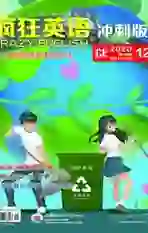主题语境十七:世界与环境(一)
2020-12-29陈秀凡
陈秀凡
上海市出台的《上海市生活垃圾管理条例》严格地对垃圾进行分类,要求人们按照干垃圾、湿垃圾、可回收物和有害垃圾的标准分类投放垃圾。“你是什么垃圾”曾成为一个高频的话题。
关于垃圾分类的真相
“What kind of rubbish are you?” This question might normally provoke(引发) anger, but in
Shanghai it has caused weary groans over the past year. On July 1st,2019, the city introduced strict trash?sorting regulations that are expected to be used as a model for the country.
Residents must divide their waste into four separate categories and toss it into specific public bins. They must do so at scheduled times, when monitors are present to ensure compliance and to inquire into the nature of ones rubbish. Violators(违反者) face the prospect of fines and worse.
Shanghai authorities are responding to an obvious environmental problem. It generates 9m tonnes of garbage a year, more than Londons annual output and rising quickly. But like other cities in China, it lacks a recycling system. Instead, it has relied on trash pickers to sift through the waste, plucking out whatever can be reused. This has limits. As people get wealthier, fewer of them want to do such dirty work. The waste, meanwhile, just keeps piling up. China churns out 80bn pairs of disposable chopsticks a year.
The threat of punishment is integral to Shanghais drive. On the first day of enforcement, the government sent 3,600 city?management officers, a quasi?police force, to 4,216 rubbish?collection points. They began by making an example of wealthy foreigners: the first warning was issued to Swiss[o][^]tel Grand, a five?star hotel, for improper sorting. Individuals who fail to recycle could be hit with fines at most 200 yuan($29). For repeat violators, the city can add black marks to their credit records, making it harder for them to obtain bank loans or even buy train tickets.
Some object to this. Peng Feng of the Shanghai Academy of Social Sciences warns that the use of the credit system is overkill, raising a risk that officials will abuse their power. But others say a tough
campaign is necessary.“Slowly people will get used to it,” says Li Changjun of Fudan University. Many residents appear to support the idea of recycling in general but are frustrated by the details. Rubbish must be divided according to whether it is food, recyclable, dry or hazardous, the distinctions among which can be perplexing, though there are apps to help work it out.
Some have complained about the rules surrounding food waste. They must put it straight in the requisite public bin, forcing them to tear open plastic bags and toss it by hand. Most vexing are the short windows for dumping trash, typically a couple of hours, morning and evening. Along with the monitors at the bins, this means that people go at around the same time and can keep an eye on what is being thrown out; no one wants to look bad.
But it is inconvenient. “People have to get to work. We dont have the time for this,” said Mr Wu
as he threw out rubbish outside his apartment building. To your correspondents untrained eye, his sorting looked impeccable.
1. What if individuals break the trash?sorting regulations?
A. They will be fined 200 yuan.
B. They will be warned for the first time.
C. They will face the prospect of fines and more.
D. They will be added black marks to their credit records.
2. What can we infer from the fifth paragraph?
A. Some people object to the trash?sorting regulations.
B. All residents support the idea of recycling generally.
C. People in Shanghai have got used to sorting the trash.
D. Many residents are disappointed with the details of the regulations.
3. Where do you think this passage comes from?
A. A novel. B. A journal. C. A magazine. D. A news comment.
Difficult sentence
They must do so at scheduled times, when monitors are present to ensure compliance and to inquire into the nature of ones rubbish.
【翻譯】
【点石成金】这是一个主从复合句,They must do so at scheduled times是主句,when monitors are present to ensure compliance and to inquire into the nature of ones rubbish是关系副词when引导的非限制性定语从句,不定式短语to ensure compliance and to inquire into the nature of ones rubbish作目的状语。
